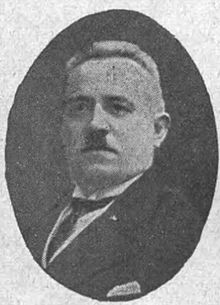Walery Roman: Difference between revisions
removed Category:People from Marijampolė County; added Category:People from Kalvarija using HotCat |
m https://en.wikipedia.org/w/index.php?title=Special%3AContributions&target=Hamtrane&namespace=all&tagfilter=&topOnly=1&start=&end=&limit=100 |
||
| (17 intermediate revisions by 14 users not shown) | |||
| Line 1: | Line 1: | ||
{{Short description|Polish lawyer and politician}} |
|||
{{Unreferenced|date=December 2020}} |
|||
[[File:Walery Roman.jpg|thumb|Walery Roman.]] |
[[File:Walery Roman.jpg|thumb|Walery Roman.]] |
||
'''Walery Roman''' (1877-1952) was a Polish lawyer and politician. His early government career was related to the creation of the [[Regency Kingdom]]. Supported of [[Józef Piłsudski]]. In the [[aftermath of World War I]] he was involved in the establishment of Polish judiciary in the [[Suwałki]] region, and negotiations between Poland, Lithuania and Germany ([[Ober-Ost]]); in 1921 received the [[honorary citizenship]] of Suwałki. Voivode of the [[Polesie Voivodeship]] from 1921 |
'''Walery Roman''' (1877-1952) was a Polish lawyer and politician. His early government career was related to the creation of the [[Regency Kingdom]]. Supported of [[Józef Piłsudski]]. In the [[aftermath of World War I]] he was involved in the establishment of Polish judiciary in the [[Suwałki]] region, and negotiations between Poland, Lithuania and Germany ([[Ober-Ost]]); in 1921 received the [[honorary citizenship]] of Suwałki. Voivode of the [[Polesie Voivodeship]] from 1921 to 1922, Polish government's delegate to [[Republic of Central Lithuania]] in 1922-1924 during the region's transformation into the [[Wilno Voivodeship (1923–1939)|Wilno Voivodeship]]. Participant of Piłsudski's [[May Coup (Poland)|May Coup]] of 1926; deputy to Polish parliament from [[sanacja]]'s the [[Nonpartisan Bloc for Cooperation with the Government]] (BBWR) party until 1935. Retired from politics afterwards, continued his career as a lawyer until 1950. |
||
{{Authority control}} |
|||
{{Persondata <!-- Metadata: see [[Wikipedia:Persondata]]. --> |
|||
| NAME = Roman, Walery |
|||
| ALTERNATIVE NAMES = |
|||
| SHORT DESCRIPTION = |
|||
| DATE OF BIRTH = 1877 |
|||
| PLACE OF BIRTH = |
|||
| DATE OF DEATH = 1952 |
|||
| PLACE OF DEATH = |
|||
}} |
|||
{{DEFAULTSORT:Roman, Walery}} |
{{DEFAULTSORT:Roman, Walery}} |
||
[[Category:1877 births]] |
[[Category:1877 births]] |
||
[[Category:1952 deaths]] |
[[Category:1952 deaths]] |
||
[[Category:People from Kalvarija]] |
[[Category:People from Kalvarija, Lithuania]] |
||
[[Category:Nonpartisan Bloc for Cooperation with the Government politicians]] |
[[Category:Nonpartisan Bloc for Cooperation with the Government politicians]] |
||
[[Category:Polish lawyers]] |
[[Category:20th-century Polish lawyers]] |
||
{{Poland-politician-stub}} |
{{Poland-politician-stub}} |
||
[[pl:Walery Roman]] |
|||
Latest revision as of 12:57, 13 September 2023

Walery Roman (1877-1952) was a Polish lawyer and politician. His early government career was related to the creation of the Regency Kingdom. Supported of Józef Piłsudski. In the aftermath of World War I he was involved in the establishment of Polish judiciary in the Suwałki region, and negotiations between Poland, Lithuania and Germany (Ober-Ost); in 1921 received the honorary citizenship of Suwałki. Voivode of the Polesie Voivodeship from 1921 to 1922, Polish government's delegate to Republic of Central Lithuania in 1922-1924 during the region's transformation into the Wilno Voivodeship. Participant of Piłsudski's May Coup of 1926; deputy to Polish parliament from sanacja's the Nonpartisan Bloc for Cooperation with the Government (BBWR) party until 1935. Retired from politics afterwards, continued his career as a lawyer until 1950.
